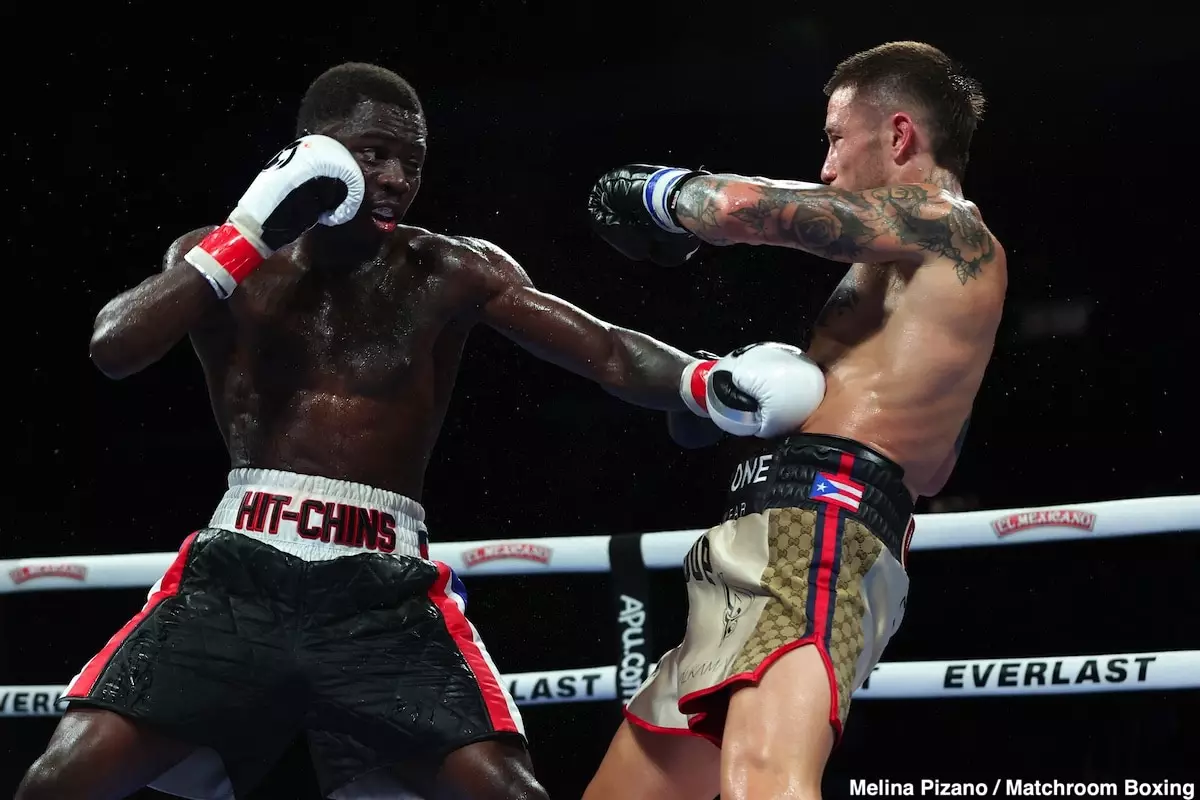In the high-stakes arena of professional boxing, negotiations can often become muddled, leading to misunderstandings and speculation. A recent case in point involves IBF light welterweight champion Richardson Hitchins and WBO champion Teofimo Lopez. Hitchins has emphatically denied allegations that he asked for an exorbitant sum of $2.5 million to face Lopez on May 2. He insists that not only was he never given a formal offer but also that the rumors surrounding his supposed demand stem from Lopez’s own fabricated claims. Such a scenario raises questions about the transparency—or lack thereof—within the boxing industry and its impact on fighter relationships.
The dynamics of this situation are indicative of a broader trend where fighters sometimes rely on sensational narratives to steer public perception. Hitchins’ frustration with Lopez’s decision to face Arnold Barboza Jr. instead exemplifies how promotions can prioritize certain matchups over others, often at the expense of potentially intriguing bouts. Hitchins articulates that his decision to pursue Barboza was not out of preference, but rather a response to Lopez’s apparent indifference, further complicating the narrative surrounding both fighters.
Hitchins, while currently positioned as a champion, is grappling with the reality of promotional influence and the unpredictability of the sport. His longing for a bout against Lopez seems sincere; yet, it is undercut by an apparent lack of interest from Lopez’s camp. The boxing community often witnesses a disconnect between a fighter’s desire for high-profile clashes and the opportunities that actually present themselves. Hitchins is left feeling sidelined, asserting that he possesses a significant storyline that could bolster interest in a matchup with Lopez.
The reality is stark: a mismatch of ambition and opportunity often leaves fighters at the mercy of promotional entities. Hitchins believes that a fight with Lopez would not only serve as an exciting matchup, but also elevate the stakes in the 140-lb division, which is currently replete with promising talents. However, Lopez’s shift to Barboza, who possesses less name recognition than Hitchins, raises eyebrows and suggests that financial considerations may ultimately overshadow competitive integrity in the decision-making process.
Hitchins’ conviction about his worthiness as a competitor reveals a deeper yearning for recognition within the boxing hierarchy. By comparing himself to Barboza, he emphasizes his standing in the world of boxing and how pivotal his involvement in major bouts can be for the sport’s landscape. His claim that “my name is way bigger than Barboza” speaks to a larger sentiment among fighters who often find themselves negotiating their value in a space teeming with ego and ambition.
The implications of such negotiations extend beyond financial remuneration; they strike at the heart of a fighter’s legacy. Hitchins alludes to the missed opportunities that a fight against Lopez could afford both fighters—it could redefine their careers and energize the division. Yet, Lopez’s decision to pursue what Hitchins perceives as an easier path only underscores the uncertainty and, at times, the lack of courage within fighter negotiations.
As Hitchins prepares for a confrontation with Barboza, he remains optimistic about what the future holds, not just for himself but for the entire boxing community. It is evident that matchmaking in boxing is fraught with complications and the interplay of various stakeholders makes it challenging to put the right fights together. The prospect of a significant matchup, one that could increase fan engagement and possibly usher in new rivalries, remains tantalizingly out of reach.
Hitchins’ desire to create a “spectacular performance” in New York underscores a commitment to excellence, but the bureaucratic and financial intricacies of boxing remain daunting. As discussions about potential fights with names like George Kambosos linger in the air, fans are left to ponder the backdrop of these negotiations and the implications they have for the sport’s future. It is a poignant reminder that in the world of boxing, what seems straightforward frequently becomes enveloped in complexity, far removed from the clean narratives fans desire.


Leave a Reply